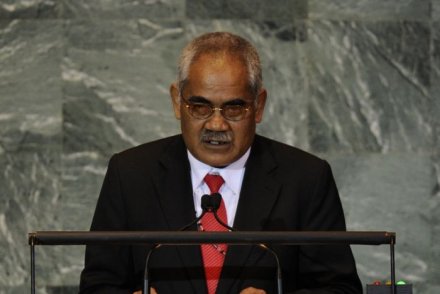
AUCKLAND (Pacific Media Watch/ 95bFM): Tuvalu’s political upheaval with a dramatic change in prime minister has been featured in several radio programmes this week.
After a drawn-out political process, Enele Sopoaga replaced Willy Telavi as Prime Minister of Tuvalu this week.
That happened after a no-confidence motion was carried, and the former Prime Minister Willy Telavi subsequently had to resign.
“Before 2012, Sopoaga was Tuvalu’s United Nations Ambassador, and he is a well-known figure across the Pacific. He is a vocal supporter of a UN climate change agreement, and has been described as Tuvalu’s climate change negotiator,” Pacific Media Watch editor Daniel Drageset told 95bFM’s The Wire programme this week.
The Tuvalu political situation reached its climax when eight of Tuvalu’s 15 MPs supported the vote of no confidence last week.
Prior to that, Telavi had been accused of delaying a vital byelection after the Minister of Finance died in December last year.
“The period since the Minister of Finance, Lotoala Metia, died…has been very turbulent in Tuvalu with former Prime Minister Willy Telavi trying all he could to hold on to his power,” Drageset told 95bFM's Maddie Farman.
Shifted balance
When the byelection was finally carried out on June 28, after the High Court had stepped in and demanded it to go ahead, the balance in Parliament shifted in favour of the Opposition.
Consequently, opposition MPs wished to reconvene Parliament to replace Willy Telavi as Prime Minister.
The ex-Prime Minister did not have any plans for Parliament to meet though.
“We only need to hold Parliament if there’s something to discuss,” Telavi told Radio Australia’s Pacific Beat programme.
As Parliament only needs to convene once every year, Telavi could theoretically have waited until December to convene Parliament.
The opposition MPs hence called on Governor-General, Sir Iakoba Italeli, to use his powers to call Parliament.
Fired Governor-General
To Willy Telavi’s dismay, the Tuvaluan Governor-General agreed with the Opposition and called Parliament to convene, which eventually led to the change of prime ministers.
When Telavi heard that the Governor-General had called Parliament to meet, he announced that the Governor-General had been fired.
"I was trying to see him. After I got a message from security I thought the Governor-General didn't have any time to see me so I returned to my cabinet and we decided that we [should] remove him because he's no longer in cooperation with the government, " Telavi told Radio Australia.
Telavi then wrote to Queen Elizabeth II, as head of state of Tuvalu, and informed her that he had dismissed the Governor-General.
No confirmation was received from the Queen, and the Governor-General remained in his position.
The ex-Prime Minister also rejected that the by-election that shifted balance in Parliament was delayed for political gain.
“No, no, no. We had a problem with one of the electorates where there had been some abuses of human rights,” he said.
Listen to the full 95bFM interview with Daniel Drageset
This work is licensed under a Creative Commons Attribution-NonCommercial 3.0 New Zealand Licence.




